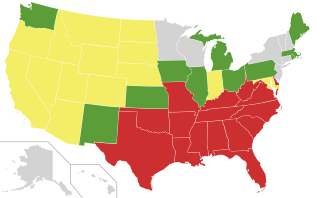
Interracial marriage has been legal throughout the United States since at least the 1967 U.S. Supreme Court (Warren Court) decision Loving v. Virginia (1967) that held that anti-miscegenation laws were unconstitutional via the 14th Amendment adopted in 1868.[1][2] Chief Justice Earl Warren wrote in the court opinion that "the freedom to marry, or not marry, a person of another race resides with the individual, and cannot be infringed by the State."[1] Interracial marriages have been formally protected by federal statute through the Respect for Marriage Act since 2022.
Historical opposition to interracial marriage was frequently based on religious principles. Many Southern evangelical Christians saw racial segregation, including in marriage, as something divinely instituted from God. They held that legal recognition of interracial couples would violate biblical teaching and hence their religious liberty.[3] Roman Catholic theology, on the other hand, articulated strong opposition to any state-sanctioned segregation on the grounds that segregation violated human dignity.[4] Since Loving, states have repealed their defunct bans, the last of which was Alabama in a 2000 referendum.
Public approval of interracial marriage rose from 5% in the 1950s to 94% in 2021.[5] The number of interracial marriages as a proportion of new marriages has increased from 3% in 1967 to 19% in 2019.[6]
- ^ a b "Loving v. Virginia". Oyez. Retrieved September 29, 2019.
- ^ "Loving v. Virginia". LII / Legal Information Institute. Retrieved September 29, 2019.
- ^ Coffman, Elesha (January 15, 2011). "Almighty God Created the Races: Christianity, Marriage & American Law". Christian Scholar’s Review. Retrieved August 2, 2023.
- ^ Coffman, Elesha (January 15, 2011). "Almighty God Created the Races: Christianity, Marriage & American Law". Christian Scholar’s Review. Retrieved August 31, 2024.
- ^ McCarthy, Justin (September 10, 2021). "U.S. Approval of Interracial Marriage at New High of 94%". Gallup. Retrieved December 14, 2022.
- ^ Parker, Kim; Barrasso, Amanda (February 25, 2021). "In Vice President Kamala Harris, we can see how America has changed". Pew Research Center. Retrieved December 14, 2022.